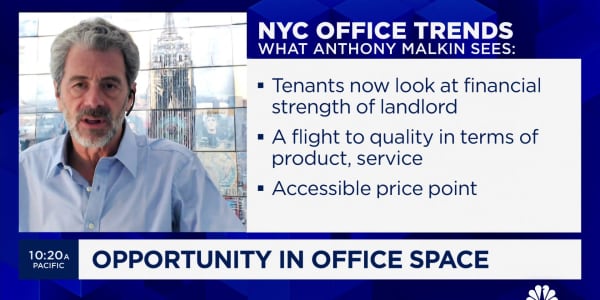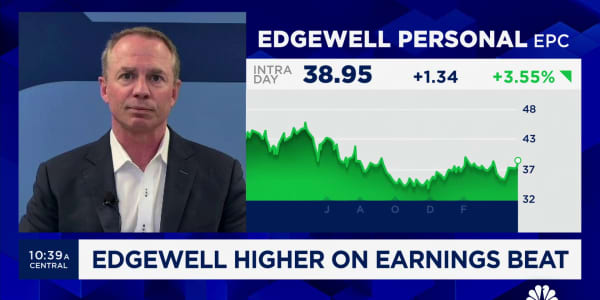Did the bonus system on Wall Street cause the financial crisis? Are bonuses still putting our financial system at risk?
An affirmative answer to those questions is the underlying thesis of Nassim Taleb's op-ed in the New York Times today. Taleb, the financier famous for authoring "The Black Swan," proposes ending bonuses for all systemically important financial institutions: the Wall Street banks, some insurance companies, the biggest hedge funds .
Taleb is probably one of the smartest people I've ever encountered.
I've learned more from Taleb and his books than almost any other living thinker. Most people misunderstand the lessons of "The Black Swan," which is a great frustration to him. He wrote a book that tried to explain that we need to make ourselves less vulnerable to unpredictable shocks — and people instead went around trying to predict the next shock to the system. They missed the point about unpredictability, about the limits of our knowledge of future events, altogether.
A single walk with Taleb through the streets of Brooklyn changed my life in very profound ways. I eat, walk, and see differently. Eat more but simpler foods, walk more slowly, never rush to catch a subway, look at the street scenes I pass rather than just pass by on the way to my destination.
Taleb avoids the simple thesis on bonuses. The simple thesis is that bankers have an asymetric exposure to the risks they take that encourages them to take on so much risk that they put their firms at risk. If they take risky bets that pay off, they get big bonuses. If the bets destroy the firm, they are none the worse for it.
The problem with this simple thesis is that it runs contrary to the behavior of actual banking executives at the firms that failed in the financial crisis. The CEOs of Bear Stearns and Lehman Brothers, for example, each lost more than $1 billion when their firms collapsed. This was far in excess than what they made selling stock of their firms in the years preceding the crisis, as scholars Jeffrey Friedman and Wladmir Kraus point out in their book, "Engineering the Financial Crisis."
If Dick Fuld and Jimmy Cayne knew they were risking their firms, they surely would have taken much more money off the table by selling nearly all stock they owned in their firms. It makes no sense to say that they risked over a billion dollars in downside risk for tens of millions of dollars in upside gains.
This was not just true of Bear and Lehman. The financial crisis resulted in tens of billions of dollars in losses for those inside Wall Street firms. Even despite the bailouts, most of Merrill Lynch's brokers and investment bankers are still underwater on their stock. To propose that the incentives in the bonus system convinced them to lose far more than they could have ever made by taking risks is absurd.
The truth is that bankers don't face the kind of asystemetrical risk-reward incentives that the simple thesis proposes. Except at the most junior levels, Wall Street executives have tremendous downsides that tend to make them risk adverse.
As Friedman and Kraus forcefully argue in their book, it seems that ignorance of the actual riskiness of the positions taken on by Wall Street firms is far more responsible for the financial crisis than deliberately ignoring those risks in pursuit of higher bonuses.
Taleb is all too familiar with the idea that people are ignorant of the real risks they are taking, so he makes a far more nuanced case against Wall Street bonuses.
In Taleb's view, it was not just the perverse incentives of the bonus system that lead to too much risk-taking. Something else was necessary. In order for the bonus system to lead to a crisis, you needed something that would let bankers believe they could take on outsized risks that would potentially put their own firms at risk, but wouldn't personally result in the kind of losses experienced by Fuld and Cayne.
What was that extra ingredient that could transform the bonus system into a death trap for the financial system?
It was the government of the United States of America.
Or, more precisely, the belief of banking executives that their downside risk was limited by the ability of the government to bail them out in the event of catastrophic failure.
In other words, it was not the bonus system alone that led to the financial crisis. It was the bonus system, plus the belief in an implicit government backstop, that led to the financial crisis.
This idea matches up with the record fairly well. We know that a lot of top Wall Street executives subjectively believed that the Federal Reserve would support them if failure loomed. They had historical experiences, such at the 1998 bailout of Long-Term Capital Management, that confirmed this belief.
The journalistic accounts of events at Lehman and Bear report executives holding this belief.
Under this view, the losses at Bear and Lehman were caused not just by ignorance of the riskiness of the mortgage-related securities, but by ignorance of the pain financial regulators were willing to inflict on failed financial firms. Cayne and Fuld were not only mistaken about mortgage risk — they were mistaken about the strength of government support for their firms.
The best solution to this would be to remove the ability of government to bail out financial firms. Indeed, the Dodd-Frank financial reforms attempt to do this. Unfortunately, this scheme is not credible. It is riddled with holes that would allow regulators to provide a bailout for the health of the financial system.
"The promise of 'no more bailouts,' enshrined in last year’s Wall Street reform law, is just that — a promise. The financiers (and their lawyers) will always stay one step ahead of the regulators. No one really knows what will happen the next time a giant bank goes bust because of its misunderstanding of risk," Taleb explains.
Similarly, greater supervisory regulation is unlikely to help.
Regulators are hopelessly outmatched. And, in any case, the problem of mistakes about risk, about unpredictable events, will always overwhelm the ability of regulators to prevent failure.
Taleb's answer is to end bonuses at firms large or important enough to endanger the general public. He thinks that without the incentive of bonuses, the banks would take on far less risk.
I'm not sure this is right. There's a lot of evidence that shareholders themselves want more risk, and will punish executives who decline to take on more risk. Listen to any call between bank executives and analysts and you will hear the call for putting more money to work, code for taking on more risk. Shareholders do not say they want more risk — they say they want higher returns. But it comes to the same thing.
Shareholders, after all, have the same incentives as Cayne and Fuld.
And the same blind spots about failure. The downside is limited to the loss of the value of the shares plus the value of a potential bailout.
So I'm not sure that ending bonuses would limit risk-taking or prevent catastrophic failure.
If it's Black Swans and bailouts all the way down, there may not be any solution short of actually breaking up banks or making it too costly — through extremely high capital requirements — to run a firm too big to fail.
Questions? Comments? Email us at
Follow John on Twitter @ twitter.com/Carney
Follow NetNet on Twitter @ twitter.com/CNBCnetnet
Facebook us @






